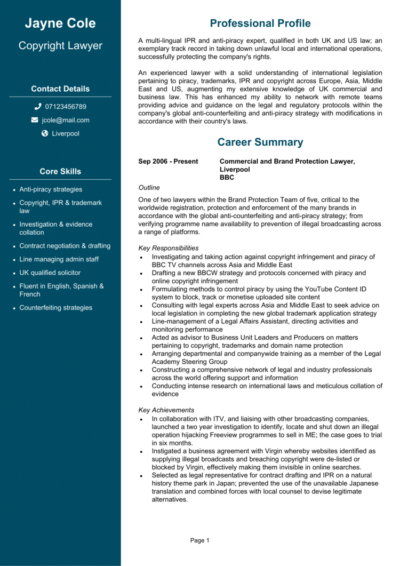Ready to make the case for yourself? As a lawyer, your CV needs to be your strongest argument yet – complete with evidence that proves your skills beyond a reasonable doubt.
It’s a rewarding and lucrative role, which this helpful and simple guide – complete with some Lawyer CV examples – will help you succeed in. Writing a CV will need to highlight your legal expertise, strategic thinking, and courtroom-ready confidence. You’ll walk into interviews and into top legal jobs.
Lawyer CV
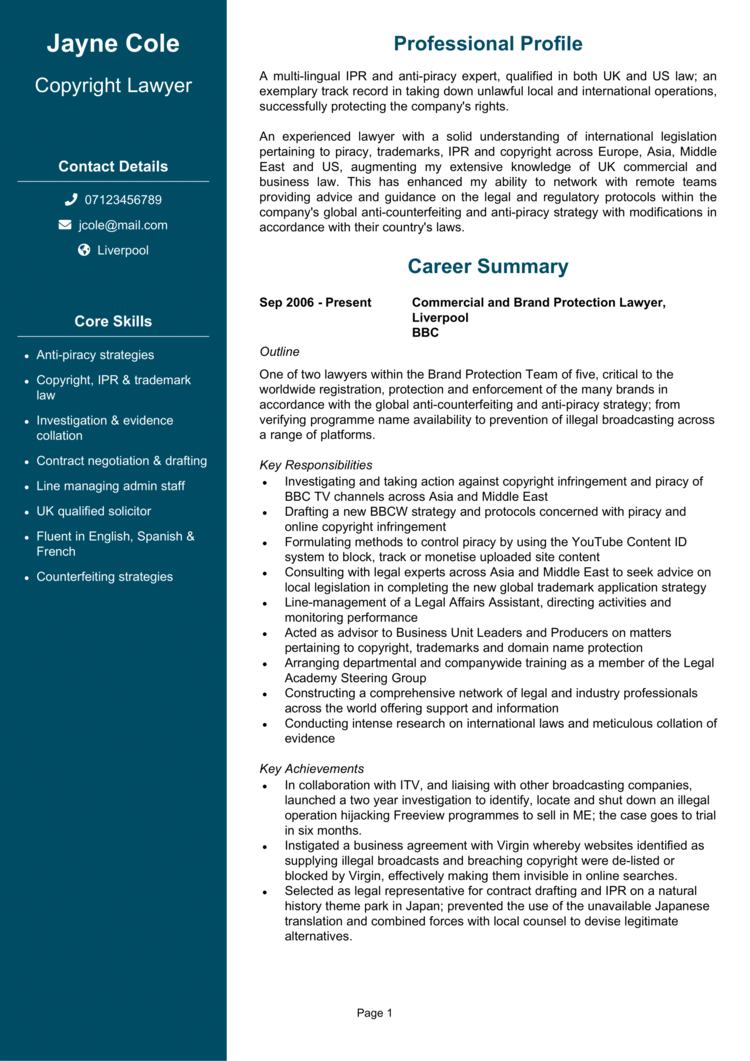
Commercial Lawyer CV
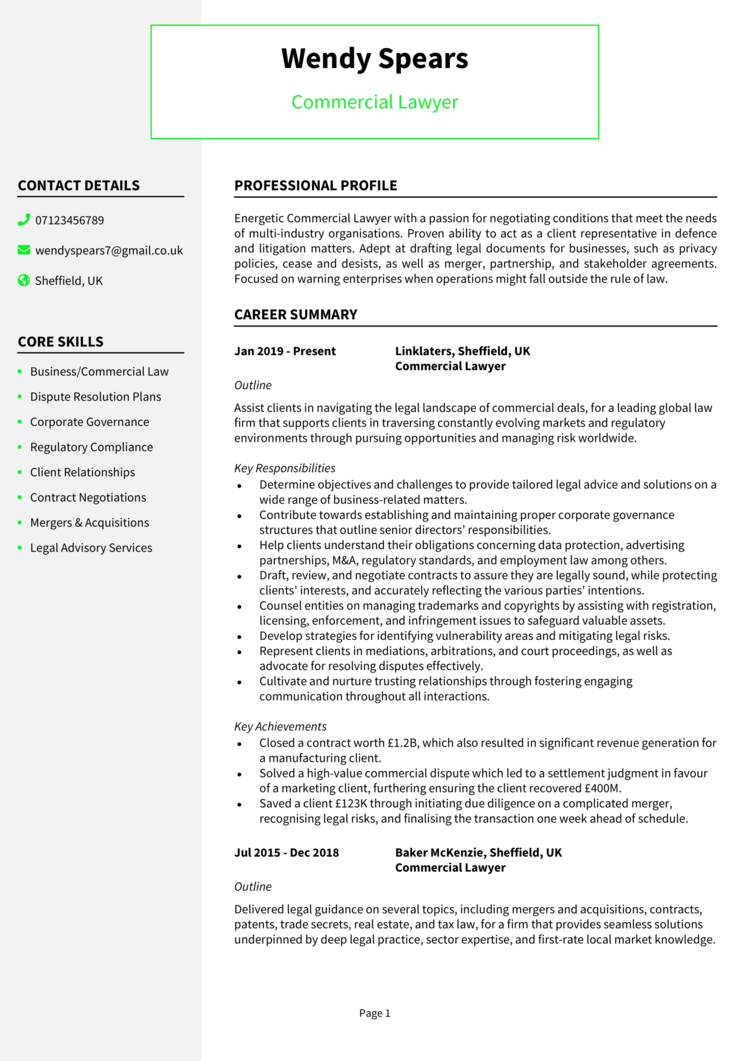
Corporate Lawyer CV
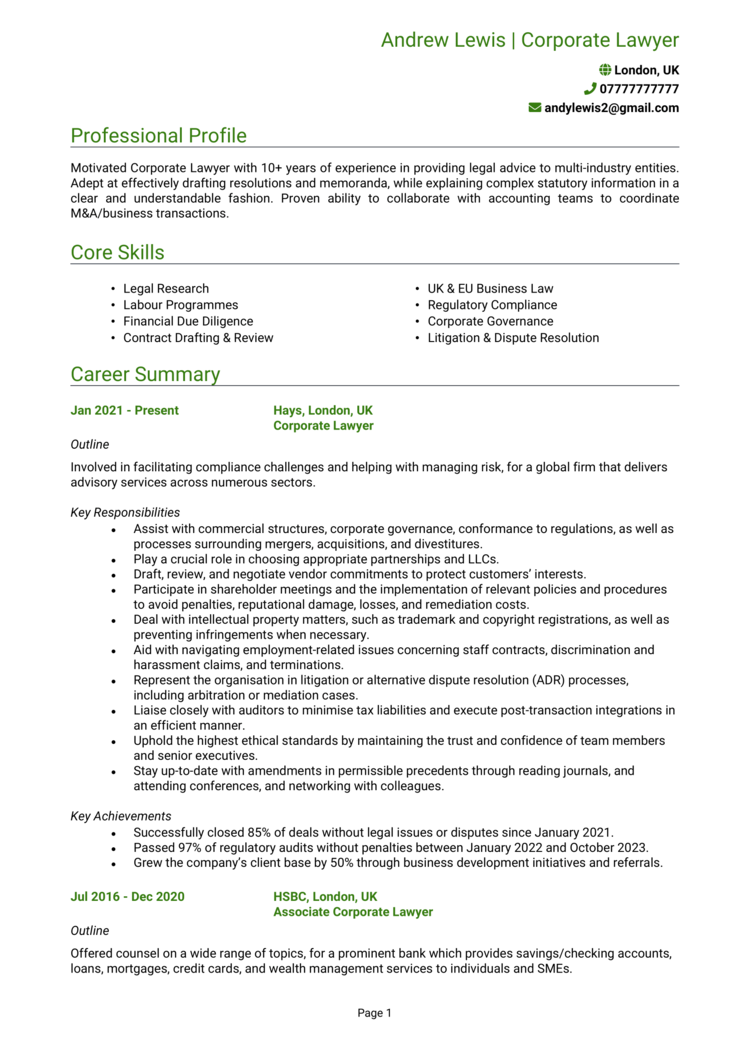
Employment Lawyer CV

In House Lawyer CV
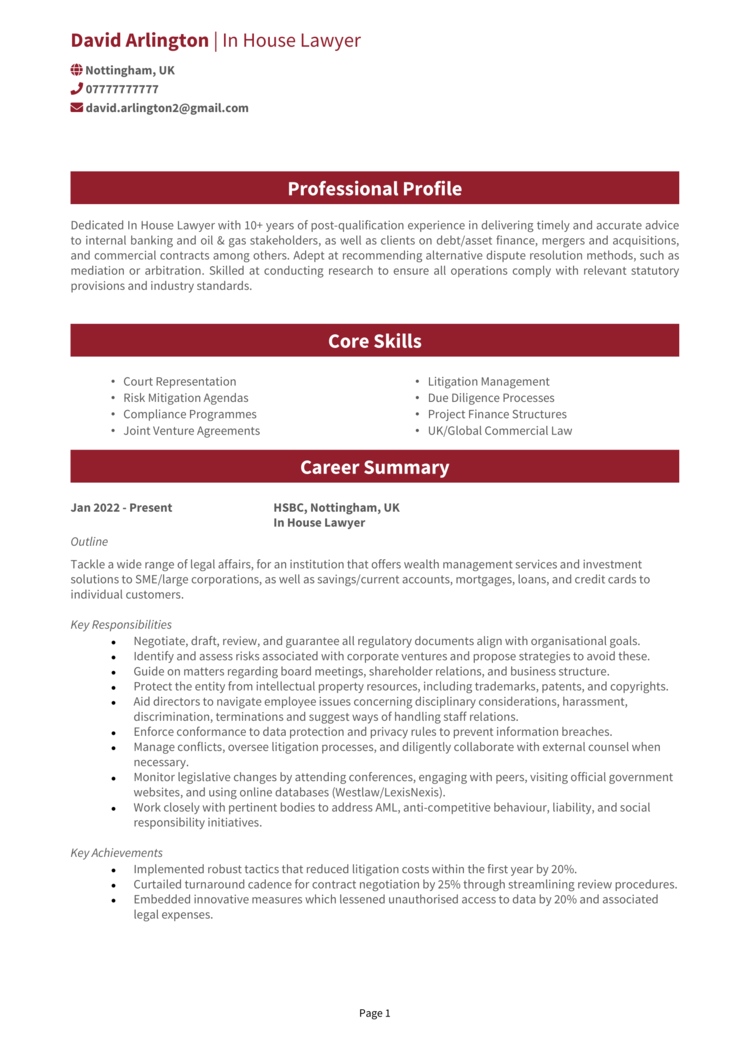
Litigation Lawyer CV
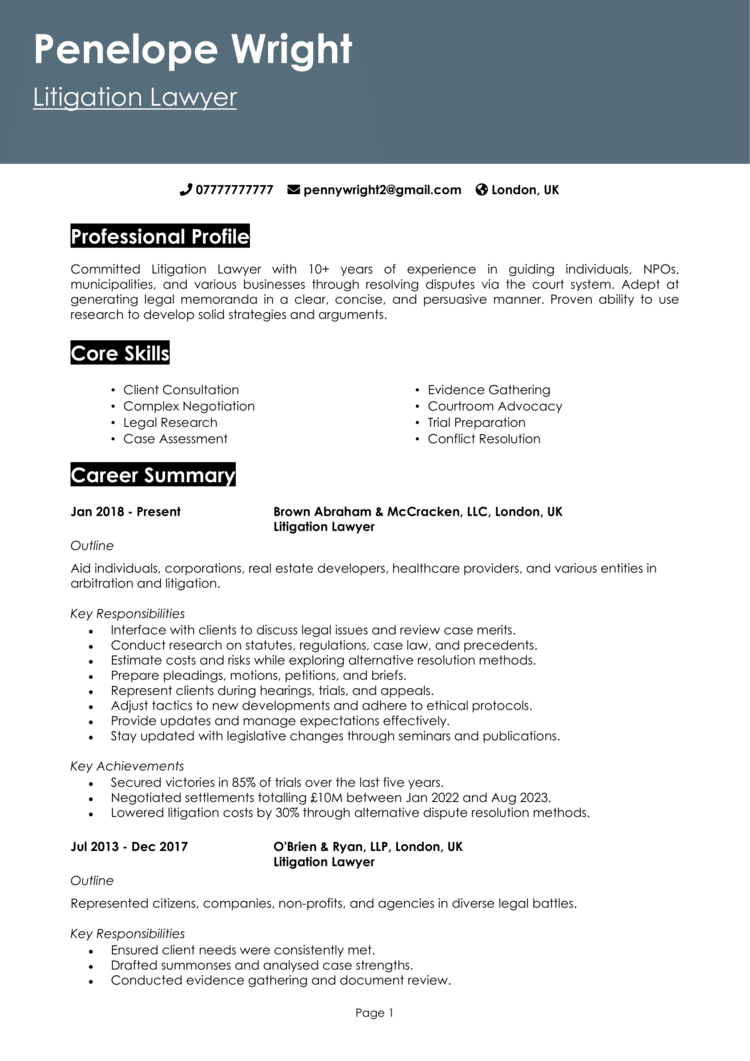
How to write your Lawyer CV
Learn how to create your own interview-winning Lawyer CV with this simple step-by-step guide.
A Lawyer CV needs to demonstrate more than just your qualifications – it’s your opportunity to show recruiters that you have the expertise and experience to navigate the complexities of the legal world. Whether you’re a seasoned solicitor or this is your first CV, recruiters want to see your ability to deliver results and manage cases effectively.
This useful guide will show you how to write a CV that proves your legal acumen, highlights your achievements, and positions you as the go-to candidate for the role.
Lawyer CV structure


Think of your CV structure as your opening statement to the recruiter – convincing, to the point, and with no objections allowed. A clear layout ensures recruiters can quickly spot why you’re the best candidate for the role.
Here’s how to structure your Lawyer CV:
- Name and contact information – Place your contact details at the top of your CV so prospective recruiters can get in touch. Including a picture of yourself is entirely optional.
- Profile – Kick off with a concise summary of your legal expertise, key skills, and career highlights.
- Core skills – Using bullet points, concisely highlight your key abilities like case management, contract negotiation, and legal research.
- Work experience – Detail your professional history in reverse chronological order, focusing on key responsibilities and outcomes.
- Education – Go through the academic qualifications, bar certifications, and any relevant training that underpin your expertise, alongside any impressive awards.
- Additional info – You can optionally add hobbies or activities here that reflect your enthusiasm for the field.
The correct format for a Lawyer CV


Your CV format should reflect the precision and professionalism you bring to your legal work. Remember: Formatting mistakes can undermine even the strongest case for your candidacy.
Here’s how to format your Lawyer CV:
- Bullet points – Use these to break down responsibilities and achievements into concise, skimmable sections.
- Divide sections – Clear headings make it easy for recruiters to find key information.
- Use a clean font – Choose a professional and readable font that mirrors your attention to detail.
- Keep it the right length – No more than 2 pages, providing enough detail and length to highlight your expertise while keeping the recruiter engaged.
Lawyer CV profile


Your profile is your chance to prove to recruiters you’re not just another name on the docket – you’re the legal expert they’ve been waiting for. A good CV gives recruiters a compelling opening argument about your legal expertise and achievements.
Lawyer CV profile examples
Profile 1
Dedicated Lawyer with six years of experience in corporate law, specialising in mergers and acquisitions, compliance, and contract negotiation. Skilled in providing strategic legal advice and drafting detailed agreements to support business goals.
Profile 2
Organised Lawyer with four years of experience in family law, adept at handling divorce cases, child custody disputes, and mediation. Proficient in preparing court documents, managing case files, and advocating for clients in hearings.
Profile 3
Experienced Lawyer with over eight years of expertise in criminal law, focusing on representing clients in complex litigation and providing legal counsel on regulatory compliance. Skilled in trial preparation, legal research, and negotiation.
What to include in your Lawyer CV profile
Here are some tips on what to include in your Lawyer CV profile:
- Where you’ve worked – Make a note of the sorts of law firms, in-house legal teams, or public sector organisations you’ve done legal work for.
- Your top qualifications – Highlight your degree in law, bar membership, or other relevant certifications.
- Key skills – Make sure to specifically name the abilities like litigation, contract drafting, and client advocacy in your CV profile.
- Types of cases you’ve handled – Reference areas like corporate law, family law, or criminal defence.
- Stakeholders you’ve worked with – Mention clients, government bodies, or internal teams.
How to present your core skills section properly


Your CV skills section is like your opening statement – it gives recruiters a clear snapshot of your abilities and specialisations.
For Lawyers, this section should focus on technical expertise, legal research, and client management. Tailor it to the specific role or practice area you’re applying for.
Top skills for your Lawyer CV
- Legal Research – Conducting thorough research on case law, statutes, and legal precedents to support case arguments.
- Contract Drafting – Preparing, reviewing, and negotiating contracts to ensure clarity and protect client interests.
- Litigation Management – Representing clients in court, managing case files, and presenting evidence effectively.
- Regulatory Compliance – Advising clients on adhering to local, national, and international laws and regulations.
- Case Strategy Development – Crafting comprehensive legal strategies to achieve the best possible outcomes for clients.
- Mediation and Arbitration – Resolving disputes outside of court through alternative dispute resolution methods.
- Document Review – Analysing legal documents for accuracy, risk assessment, and compliance with applicable laws.
- Client Advocacy – Representing and defending client positions in legal proceedings or negotiations.
- Court Filing Procedures – Managing filing processes and ensuring adherence to procedural rules and deadlines.
- Specialised Legal Expertise – Providing counsel in specific areas such as intellectual property, corporate law, or criminal defence.
How to write a strong work experience section for your CV


Your work experience section is where you prove your ability to handle legal responsibilities and deliver results. Highlight your contributions to major cases, successful negotiations, and client outcomes.
List your roles in reverse chronological order, focusing on key responsibilities and measurable results. If you’re low on experience, list whatever might show you’ve got the required skills and values – never leave a section blank.
The best way to structure job entries on your CV

- Outline – Give the recruiter an overview of the firm, your role, and the types of cases you handled.
- Responsibilities – List tasks like drafting legal documents, representing clients, or managing disputes. Use action verbs like “negotiated,” “advised,” or “represented.”
- Achievements – Showcase measurable results, such as successful case outcomes, cost savings, or client satisfaction. Include figures wherever possible to add impact.
Example jobs for Lawyer
Legal Consultant | Lexis Advisors
Outline
Advised multinational corporations on mergers and acquisitions, compliance, and contract management. Delivered legal strategies to support corporate transactions and minimise risks.
Responsibilities
- Drafted, reviewed, and negotiated complex contracts, including NDAs, shareholder agreements, and joint venture arrangements.
- Conducted due diligence for M&A deals to identify legal risks and ensure compliance.
- Provided strategic counsel on corporate governance and regulatory matters.
- Collaborated with external counsel and internal teams to resolve disputes.
- Maintained up-to-date knowledge of evolving corporate laws and industry practices.
Achievements
- Successfully closed M&A deals worth over £200M within two years.
- Reduced contract-related disputes by 30 percent through meticulous review processes.
- Recognised for implementing a streamlined compliance framework across a major client’s operations.
Lawyer | Harmony Family Law
Outline
Provided legal representation and advice in family law matters, focusing on achieving fair resolutions in emotionally challenging cases. Maintained a client-centric approach to ensure trust and satisfaction.
Responsibilities
- Represented clients in court hearings for divorce, child custody, and alimony disputes.
- Drafted and submitted legal documents, including petitions, motions, and settlement agreements.
- Conducted mediation sessions to resolve disputes amicably and avoid prolonged litigation.
- Advised clients on their rights and legal options, tailoring strategies to individual cases.
- Maintained accurate and confidential case files, ensuring compliance with GDPR.
Achievements
- Resolved 85 percent of cases through mediation, reducing court time and costs for clients.
- Achieved favourable outcomes in over 90 percent of custody cases.
- Commended by clients for empathy and professionalism in complex family disputes.
Lawyer | Justice Advocacy LLP
Outline
Defended clients in criminal litigation cases, providing legal advice and ensuring their rights were upheld. Managed all aspects of trial preparation and courtroom representation.
Responsibilities
- Prepared legal strategies and arguments by conducting in-depth case research and analysis.
- Interviewed witnesses and gathered evidence to build strong defence cases.
- Represented clients in court, delivering persuasive arguments and cross-examinations.
- Negotiated plea deals with prosecutors to secure favourable outcomes for clients.
- Kept clients informed throughout the legal process, ensuring transparency and understanding.
Achievements
- Secured acquittals in 70 percent of contested criminal trials.
- Successfully negotiated reduced sentences for 80 percent of clients in plea agreements.
- Recognised for excellence in courtroom advocacy by peers and senior partners.
Education section


The education section is essential for Lawyers, as it demonstrates your foundational legal knowledge and qualifications. Include degrees, certifications, and any additional legal training.
List your qualifications in reverse chronological order, starting with the most recent.
Qualifications recruiters look for in a Lawyer
- Bachelor of Laws (LLB) – Foundational degree in legal principles and practice.
- Bar Professional Training Course (BPTC) – Required for becoming a barrister in the UK.
- Solicitor Qualifying Exam (SQE) – Certification pathway for solicitors in England and Wales.
- Master of Laws (LLM) – Advanced legal education specialising in a specific area of law.
- Mediation and Dispute Resolution Certification – Training in alternative dispute resolution methods.


